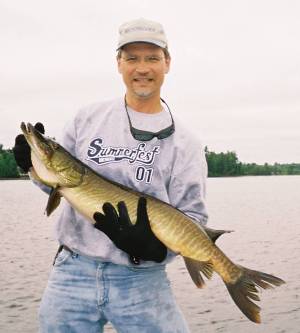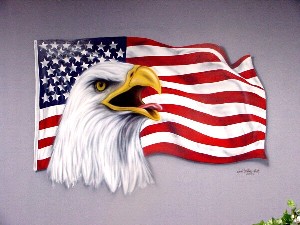|
|
Posts: 462
Location: Syracuse, Indiana | This is intended as a corrollary to the thread dealing with water temperstures. I have two surface temperature gauges in my boat. One is a Lowrance in-dash unit, the other is a part of my Eagle depthfinder. Generally speaking, the Eagle reads 1-1.5 degrees cooler than the Lowrance. I recently compared my readings to those of another fisherman, and discovered that his read about 5 degrees cooler than mine. Over the weekend, I again compared my readings with yet another fisherman, and found his to read about 10 degrees cooler than mine.
With all the discussion about water temperatures and the effect on muskies, I don't want to be in a position to cause undue harm to the fish nor do I want to miss out on fishing opportunities. Any ideas for accurate calibration of individual units? |
|
| |
|

Posts: 5874
| Ice water would be at 32.? degrees, and boiling water would be 212 degrees, depending on altitude. That is one way of checking your temp tranducer on both ends of the range. There are other ways, but they are pretty expensive.
I don't think you can adjust these units to acually calibrate them. You'll just have to factor in any error you find, when you are on the water.
Edited by Shep 6/26/2007 8:54 AM
|
|
| |
|
Posts: 462
Location: Syracuse, Indiana | Actually water may be below 32 degrees and not be frozen (depending upon movement, salination, and other things), or boil at less than 212 degrees (depending upon altitude). That said, your statement is generally accurate and is not helpful. Are you an attorney? Sorry - couldn't resist.
I'm looking for creative ways to give me my "error factor" when on the water. |
|
| |
|

Posts: 107
Location: milwaukee | I would do the following:
Fill a 5-gallon bucket with water and set it outside for a day or two, but out of the sun. Beg/borrow/steal a quality outdoor thermometer. Set it near your bucket of water.
Wait for a stable weather period with temps about 80 or so. Check the reading on the thermometer against the nearest accurate weather reporting station, using recent data. You could use a TV station, radio station, Internet, or the NOAA broadcast on your marine radio. Make note of the error, if any.
Now check the temp of the water bucket with your 'calibrated' thermometer. Should be right at air temp if you waited a day or two. Dunk your temp transducer in it and note the error.
You could also make another check down at 32 deg by making an ice bath with 20 lbs. of ice in the 5-gal bucket, topped off with water. Let it sit for a while (30 minutes to an hour, maybe?) and you can be sure it's gonna be 32 deg F, but check with your thermometer. Repeat the transducer test and note the error.
I'd think you'd be able to determine your error to within a degree or so this way.
I'll try this with my Lowrance LMS-337 and report results when done. |
|
| |
|

Posts: 5874
| Generally accurate, but not helpful. OK, but you didn't mention that you wanted a tolerance of .1 degree. You were talking 5-10 degrees difference, and wanted to know where your unit was. Pretty sure if you did as suggested, you could determine how far off your temp reading is. I assumed you were smart enough to check the ice bath and boiling water with a separate thermometer when you checked your transducer.
That said, what does it matter what the actual temp is, as long as you can find the warmest/coolest water temps on the lake you are on. Remember also, the temps you are reading are also only surface temps, and will not reflect accurately the temps more than a foot or two down.
No, I am not a lawyer, but I am an engineer. Pretty sure I know a lot more about these things than a lawyer would. Are you a school teacher? hehehe |
|
| |
|
Posts: 462
Location: Syracuse, Indiana | Nope. I'm a lawyer!  |
|
| |
|
Posts: 726
Location: Eau Claire, WI | Instead of messing buckets of boiling frozen water, why not buy a quality water thermometer that you can get a definitive reading from. Then, you know the offset for both units PLUS you can use the thermometer to take deeper temp readings. That can be helpful in determining just how hot the water is and how deep that hot water goes. This should help you make an informed decision.
Jono
|
|
| |
|
Posts: 462
Location: Syracuse, Indiana | Do you have a suggestion for a brand, and where to buy it? |
|
| |
|
Posts: 726
Location: Eau Claire, WI | Dave, I did a google search for "water temp thermometer" and got a ton of hits.
I don't own one myself but this link will help you find one that works for you:
http://www.nextag.com/temperature-thermometer-water/search-html
Check sporting goods retailers like cabelas. Biological supply businesses should have them too.
Good Luck,
Jono
|
|
| |
|

Posts: 1769
Location: Algonquin, ILL | Just go to your local Pet Store and buy a Digital Thermometer they run about $20 and are fairly accurate
Attachments
----------------
 Thermometer.jpg (39KB - 145 downloads) Thermometer.jpg (39KB - 145 downloads)
|
|
| |
|

Posts: 107
Location: milwaukee | Jono, my suggestion with the buckets and thermometer was to check the calibration at two points across the measuring range and to test against a known, reasonably good standard. Common practice in my profession.
I would not dunk my transducer in boiling water though. They are probably not rated for that temp and would possibly damage it.
So I did this test and here's what I got:
air temp per weather service = 84F
my thermometer = 84F
my air temp bucket water = 84F
Lowrance LMS-337 = 83.0F (error -1 deg)
ice bath @ 32F
my thermometer = 32F
Lowrance LMS-337 = 33.0 F (error +1 deg)
The interesting thing about the ice bath test was that it took about 1 hour for the transducer to get to 33.0F. After the first 15 minutes it was still around 50F. If they all respond that slowly, it might explain partly why there would be a difference between two units on the water that might have just come from different locations. That combined with simple error between units/mfgs and differing mounting depth below water on the transom would explain a lot.
Shep's point to just use it as a relative indication of water temp is a good one. |
|
| |
|
| Hi ER. I think your test is good. I was just joking around and, as guy with a science background, I appreciate your test to get at the error. Sorry if it came across like I thought the test was bunk. Not at all what I intended.
My point was that you could get a good thermometer and test in situ on the water against the sonar's temp with the added bonus of having a thermometer you could send deeper to find out how deep the warm water was or you could even use it to confirm thermocline.
Jono
|
|
| |
 Water Temperature Gauge Calibration
Water Temperature Gauge Calibration Water Temperature Gauge Calibration
Water Temperature Gauge Calibration